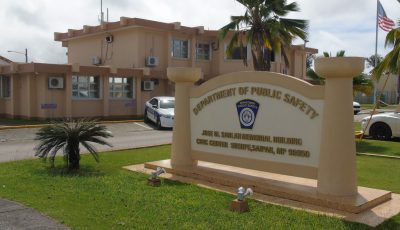Kilili: USDA funds two police vehicles for DPS
“This is good news for the people of Chalan Kanoa and San Jose, and Hagoi, Chalan Kiya, Chalan Laolao, Chalan Piao, Oleai, Susupe, and the surrounding areas,” said Sablan. “These new vehicles will allow our Department of Public Safety to step up patrols in and around these villages and respond faster when a crime occurs or when people need help.
“It is also good news for our police officers, who have had to struggle with a shortage of dependable vehicles to do their work and keep us all, residents and tourists, safe.
“The goal is to make these two vehicles the beginning of an overall fleet rejuvenation to replace aging, undependable vehicles at DPS,” Sablan said.
Public Safety representatives first met with USDA officials to discuss the urgent need for the village patrol vehicles in March at a meeting that Sablan arranged at the congressional office.
“Our DPS officers made a strong case to the visiting USDA Rural Development team from Guam and Hawaii,” Sablan recalled. “When USDA heard about the vehicle shortage and how hard it is for DPS to do its job under these circumstances they made a commitment to find federal funding for new vehicles.”
Increasing federal grant funding for the Northern Marianas has been a priority for Sablan, especially now that the Republican majority in the U.S. House of Representatives has decided to block “earmarks.”
“Members of Congress used to be able to direct funding to projects back home,” Sablan said. “Now, we all have to be a lot better at finding grant opportunities, putting together good applications, and managing the funds without error.
“So I was glad to be able to bring USDA and DPS together, and get the ball rolling on this grant and get our dedicated police officers the equipment they need to do their job,” said Sablan.
Earlier this year Sablan sponsored a grants workshop, together with the Northern Marianas College and the U.S. Department of the Interior. Over 100 people attended the multi-day sessions to learn about identifying opportunities and writing grants.
One opportunity for federal help was the USDA’s Community Facilities and Economic Impact Initiative. Grant applications for the program are graded in part on the median household income for the area to be served. So DPS applied for vehicles to patrol the villages of Chalan Kanoa and San Jose, which had the lowest median household incomes reported in the 2000 decennial census.
“Residents of Chalan Kanoa and San Jose, and the surrounding areas, will certainly be able to sleep better at night and feel safer during the day, knowing these new patrol cars will help deter crime and will get officers on the scene more quickly when a crime does occur. And our tourist economy is helped, too, when our islands are better policed and safer for visitors,” Sablan said.
He thanked Alton Kimura, Rural Development’s Community Programs director from Hawaii, as well as Joseph Diego and Bernadette Balajadia of Rural Development’s Guam office. “They all provided support and guidance to the Department of Public Safety throughout this process.”
Sablan is committed to supporting the Department of Public Safety and its officers and to helping provide needed supplies and equipment through whatever federal opportunities are available.
By Press Release



























